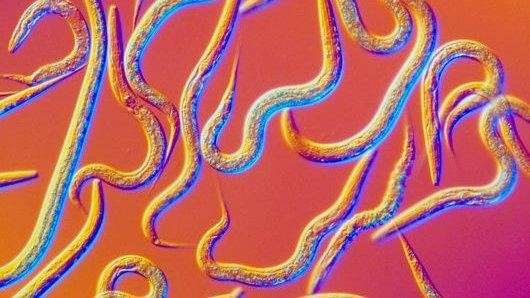When will man become machine?
- Published
Stephen Hawking has warned of the threat AI poses
"I think the development of full artificial intelligence [AI] could spell the end of the human race."
Professor Stephen Hawking's verdict on AI in a recent BBC interview wasn't exactly good news for the rest of us.
"Once humans develop AI it will take off on its own and redesign itself at an ever increasing rate. Humans, who are limited by slow biological evolution, couldn't compete and would be superseded," he said.
Machines can already "outlive" the humble human many times over, according to tech editor, investor and author Michael S Malone who grew up in Silicon Valley.
"Every living thing has one billion heartbeats in its lifetime," he told the BBC.
"The modern micro processor goes through the equivalent of 5-10 billion operations per second.
"These devices are essentially immortal. Just in the time you own your phone the micro-processor is going through almost all of human existence in terms of digital heartbeats."
So might machines contain the secret of eternal life?
Wriggle room
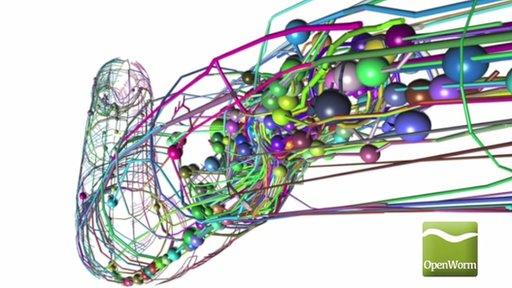
The Openworm project has mapped the 302 neuron connections inside the brain of a tiny roundworm
Scientists working on a project called OpenWorm , externalrecently mapped the 302 neuron connections which make up the small brain of a tiny roundworm - the 1mm long Caenorhabditis elegans (humans have approximately 60 trillion synapses, or connections, between 100 billion neurons), and replicated them in the form of software.
The "brain" programme was then put into a simple robot made of Lego containing motors, a sonar sensor and touch sensors.
The robot itself was not actually programmed to "do" anything - but it did.
"It is claimed that the robot behaved in ways that are similar to observed C. elegans," wrote journalist Lucy Black, external.
"Stimulation of the nose stopped forward motion. Touching the anterior and posterior touch sensors made the robot move forward and back accordingly. Stimulating the food sensor made the robot move forward."
Ms Black went on to ask some philosophical questions about what had been created.
"Is the robot a C. elegans in a different body or is it something quite new? Is it alive?"
'Silicon immortality'
And that's just one microscopic worm... what happens when it's our turn?
.jpg)
The first recipient of an artificial heart begged to be allowed to die
Mr Malone is fearful.
If Moore's Law - the doubling of transistors per square inch on integrated circuits every year, coined by Intel co-founder Gordon Moore - continues, the computers of 2030 will have as much power as the human brain, he believes.
"Then you get into this world of Ray Kurzweil [Google's director of engineering] - the singularity - at a certain point we will just map our brains into a computer and that will give us a kind of silicon immortality," he reasons.
"I wonder if the first person who maps their brain into a computer, if the first message they send back will be "pull the plug".
"What happens to consciousness, to selfhood, when your brain leaves your body and inhabits a silicon-based machine in the corner? What are you? Are you human? What happens if you can live forever but have no physical self?"
There are worrying precedents for what happens when man swaps some of his biological parts for computer or mechanical equivalents.
In 1982 a dentist from Seattle called Barney Clark became the first human recipient of an artificial heart.
He survived for 112 days but was so ill and depressed that he begged to be allowed to die, reported Wired., external
Fighting fate
So perhaps we are not emotionally ready to make that leap into the machine - but Mr Clark's experience has not deterred some of Silicon Valley's heavyweights from fighting back against mortality.
"We have this strange combination of acceptance and denial - I would prefer our mode was more one of fighting... Fighting death, fighting decline," serial tech entrepreneur and investor Peter Thiel told the BBC.
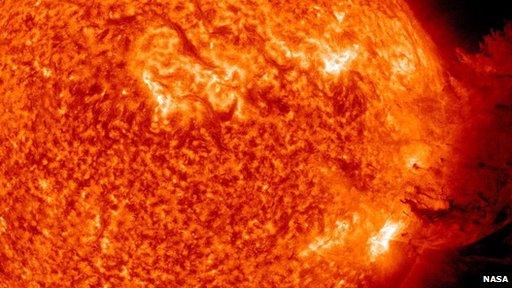
A solar flare in 2001 captured by NASA.
"It's true that death may be natural but it's also natural that we should fight death."
But let's not forget that nature itself has a habit of fighting back.
In 1859 the biggest solar storm on record took place. Called the Carrington Event after astronomer Richard Carrington, the solar flare was so powerful that there were reports of telegraph pole wires melting and causing fires.
It is not known how regularly flares of this size occur or if there will be another - but the consequences for 21st century Earth would be utterly life-changing.
"If we had one now it would take out every chip in the world," says Michael Malone.
"If that happened civilisation would sort of stop."
Hear more on the BBC World Service Business Daily podcast (25 December episode).
- Published2 December 2014
.jpg)
- Published12 June 2014
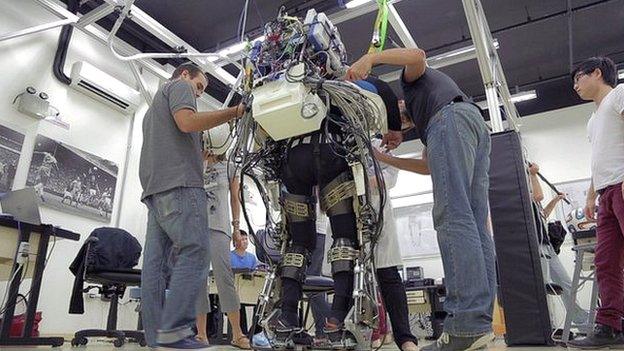
- Published21 May 2014
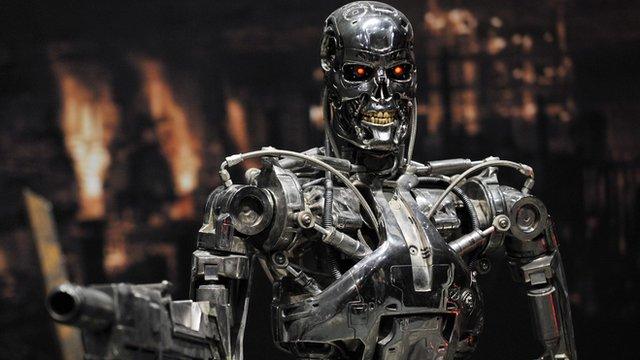
- Published3 May 2013
